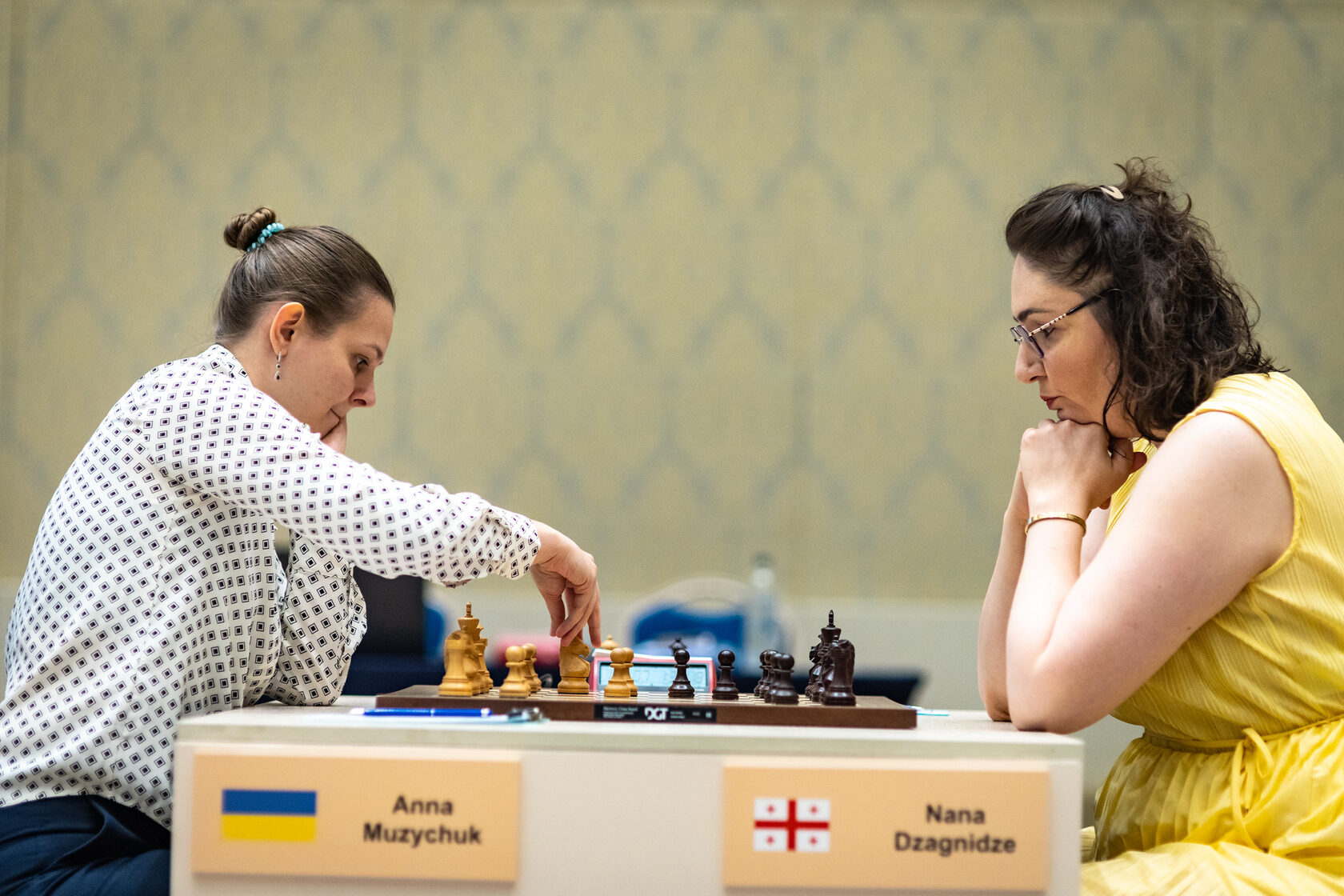Georgia's Nana Dzagnidze made a spectacular comeback from a completely lost position against Anna Muzychuk in a game that lasted four and a half hours and 102 moves. Meanwhile, Alexandra Kosteniuk capitalized on Sara Khadem's error in time trouble, finding a two-move combination that secured her victory. With 2.5 points out of four, Kosteniuk joined the leaders Assaubayeva and Tsolakidou, who drew their games
Round four of the Women's Grand Prix in Georgia ended in dramatic fashion. In a tense encounter, Nana Dzagnidze managed to save a seemingly lost game against Anna Muzychuk in an unexpected twist of events. Muzychuk surprised Dzagnidze by playing a line in the French Defense she had not prepared for, and an early imprecision by Dzagnidze cost her a pawn. Although she had chances to maintain equality, a time-trouble decision to sacrifice a bishop appeared to seal her fate.
Despite this, Dzagnidze refused to give up without a fight. "I tried giving as many checks as I could and then planned to resign," she said in an interview immediately after the game. Fortune favored her when Muzychuk, under pressure, made a critical error on move 78 by pushing her a-pawn to the seventh rank, turning what should have been a win into a dead draw. Now it was Muzychuk who found herself in desperate time trouble, but she could achieve nothing more than half a point.
Round four of the Women's Grand Prix in Georgia ended in dramatic fashion. In a tense encounter, Nana Dzagnidze managed to save a seemingly lost game against Anna Muzychuk in an unexpected twist of events. Muzychuk surprised Dzagnidze by playing a line in the French Defense she had not prepared for, and an early imprecision by Dzagnidze cost her a pawn. Although she had chances to maintain equality, a time-trouble decision to sacrifice a bishop appeared to seal her fate.
Despite this, Dzagnidze refused to give up without a fight. "I tried giving as many checks as I could and then planned to resign," she said in an interview immediately after the game. Fortune favored her when Muzychuk, under pressure, made a critical error on move 78 by pushing her a-pawn to the seventh rank, turning what should have been a win into a dead draw. Now it was Muzychuk who found herself in desperate time trouble, but she could achieve nothing more than half a point.

"I feel relieved. After drawing three games where I was winning in two and better in one, this feels like payback," Dzagnidze said. She is supported at the event by her brother, a tennis coach with little chess experience, who sat through the entire round, cheering her on.
Alexandra Kosteniuk also scored an important point today. Sporting earrings resembling a chessboard, the former Women's World Champion defeated Sara Khadem in the Scotch Game. Khadem sacrificed a pawn but had enough compensation to keep the position balanced. However, a mistake on move 31 in time trouble led to a swift defeat in just two moves. With this victory, Kosteniuk joined the leaders with 2.5/4, while Khadem, with just half a point, finds herself alone at the bottom of the standings.
Alexandra Kosteniuk also scored an important point today. Sporting earrings resembling a chessboard, the former Women's World Champion defeated Sara Khadem in the Scotch Game. Khadem sacrificed a pawn but had enough compensation to keep the position balanced. However, a mistake on move 31 in time trouble led to a swift defeat in just two moves. With this victory, Kosteniuk joined the leaders with 2.5/4, while Khadem, with just half a point, finds herself alone at the bottom of the standings.
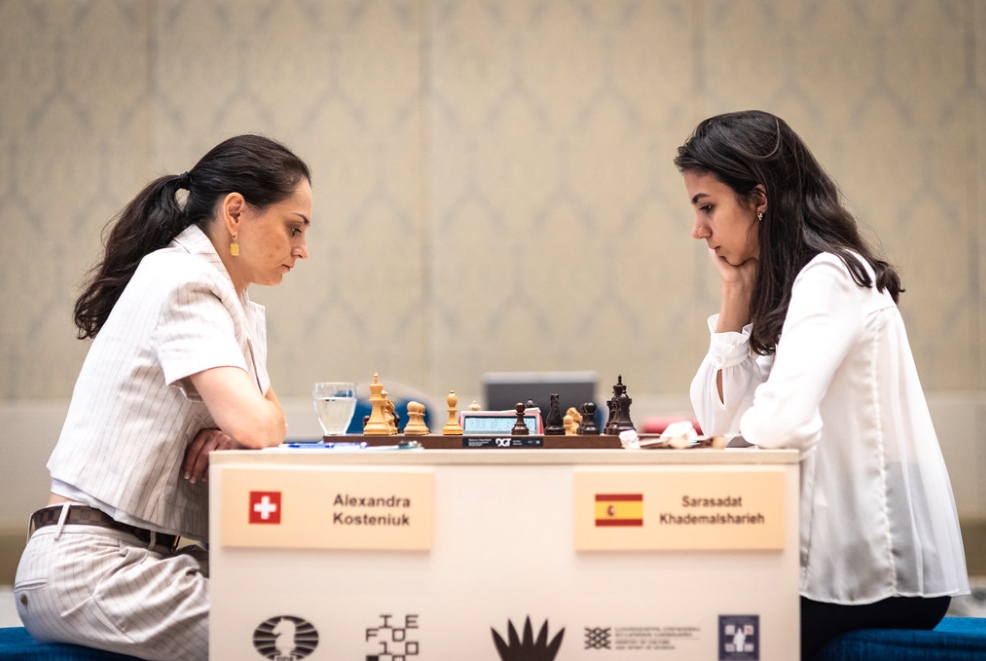
In a sharp Najdorf Sicilian, Mariya Muzychuk launched an aggressive kingside attack against Stavroula Tsolakidou. After Tsolakidou's weakening move 21...g6, Muzychuk gained a strong position, with better control of the center and more active pieces. However, a misstep with 26.Na4? allowed Tsolakidou to equalize, leading to a series of exchanges that resulted in a rook endgame. Despite being a pawn up, Muzychuk was unable to convert her advantage, and the game ended in a draw. Tsolakidou now has 2.5 points out of four, while Mariya Muzychuk has two points.
Alina Kashlinskaya and Bibisara Assaubayeva drew their game after around two hours of play, concluding in just 21 moves. Both players chose a sharp line in the King's Indian Defense. In the end, Kashlinskaya had a slight initiative and an extra pawn but opted not to press further, leading to a draw. After four rounds, Bibisara has 2.5 points, while Kashlinskaya is on two.
Alina Kashlinskaya and Bibisara Assaubayeva drew their game after around two hours of play, concluding in just 21 moves. Both players chose a sharp line in the King's Indian Defense. In the end, Kashlinskaya had a slight initiative and an extra pawn but opted not to press further, leading to a draw. After four rounds, Bibisara has 2.5 points, while Kashlinskaya is on two.
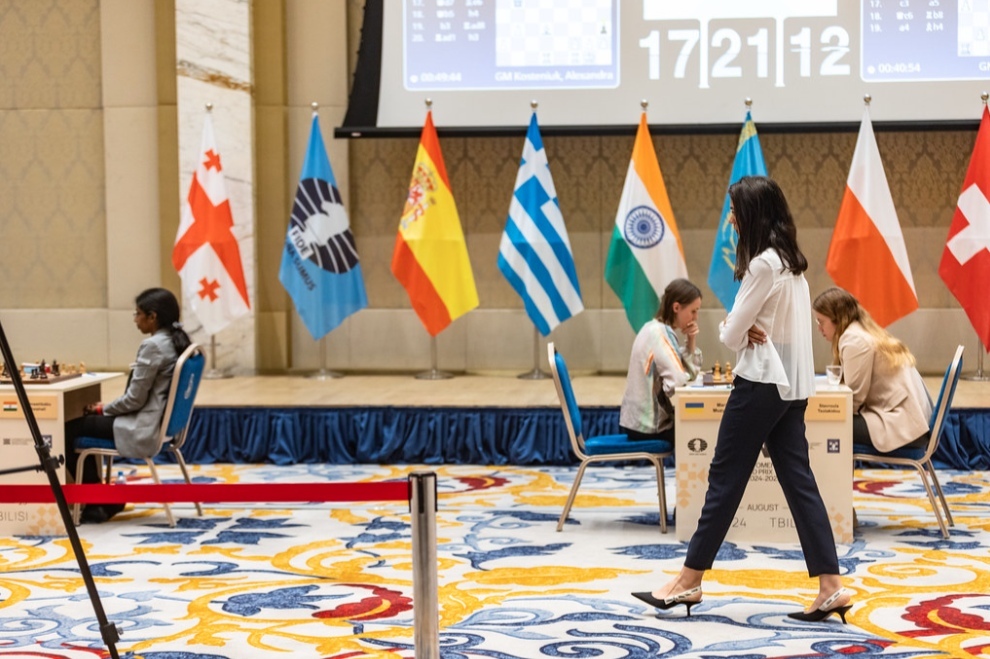
Lela Javakhishvili and Vaishali Rameshbabu drew their game in the Queen's Gambit Declined. Despite lasting 46 moves and four and a half hours, the game remained balanced throughout, with neither side gaining a significant advantage. Both players are on two points.
Standings after Round 4
Standings after Round 4
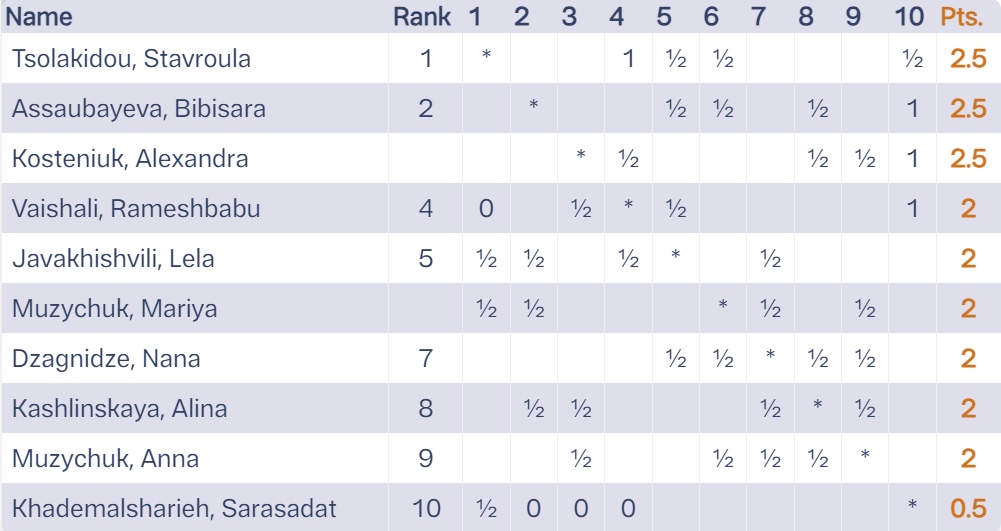
Here follows a closer look at the games of round four of the Women's Grand Prix in Tbilisi:
Alexandra Kosteniuk - Sarasadat Khademalsharieh
Alexandra Kosteniuk faced Sara Khadem as White in the Schmidt Variation of the Scotch Game. Khadem held her ground well against Kosteniuk for most of the game.
Alexandra Kosteniuk - Sarasadat Khademalsharieh
Alexandra Kosteniuk faced Sara Khadem as White in the Schmidt Variation of the Scotch Game. Khadem held her ground well against Kosteniuk for most of the game.
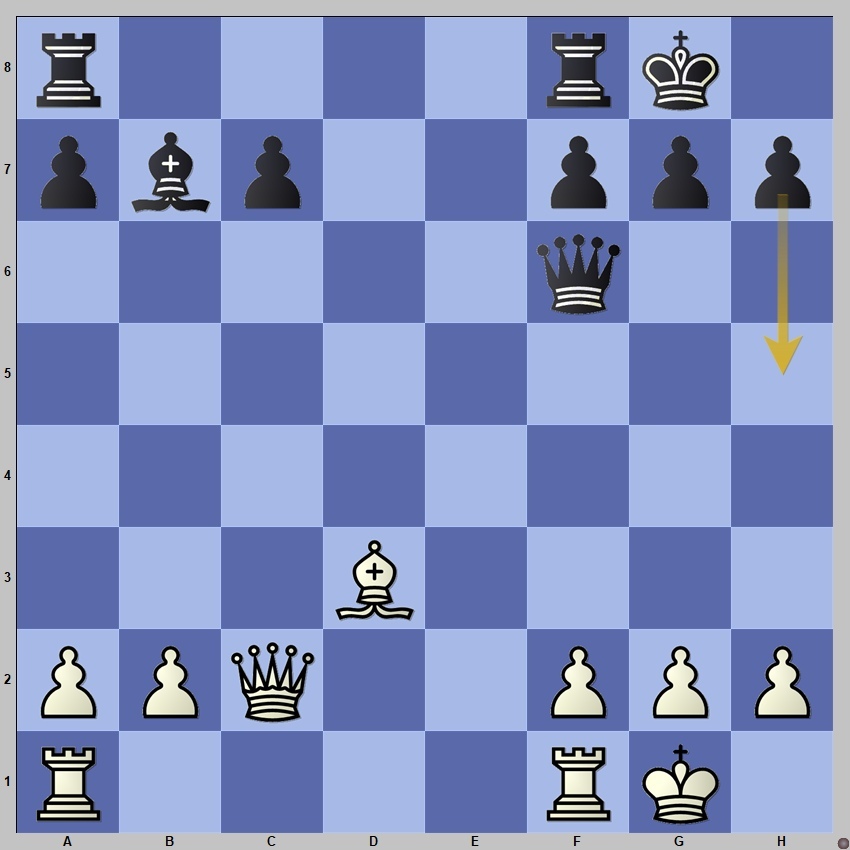
Here, Khadem spent around thirty minutes contemplating her next move. She correctly decided to sacrifice the c7 pawn and launched a pawn advance with 15…h5, creating an escape route for her king. After 16.Qxc7 Bd5, the position remained even, with White a pawn up but Black having enough compensation to hold.
However, Khadem faced one significant challenge: she was running low on time. Sensing an opportunity, Kosteniuk continued to pile on the pressure, forcing Khadem into tough decisions. Khadem managed to hold until move 31.
However, Khadem faced one significant challenge: she was running low on time. Sensing an opportunity, Kosteniuk continued to pile on the pressure, forcing Khadem into tough decisions. Khadem managed to hold until move 31.
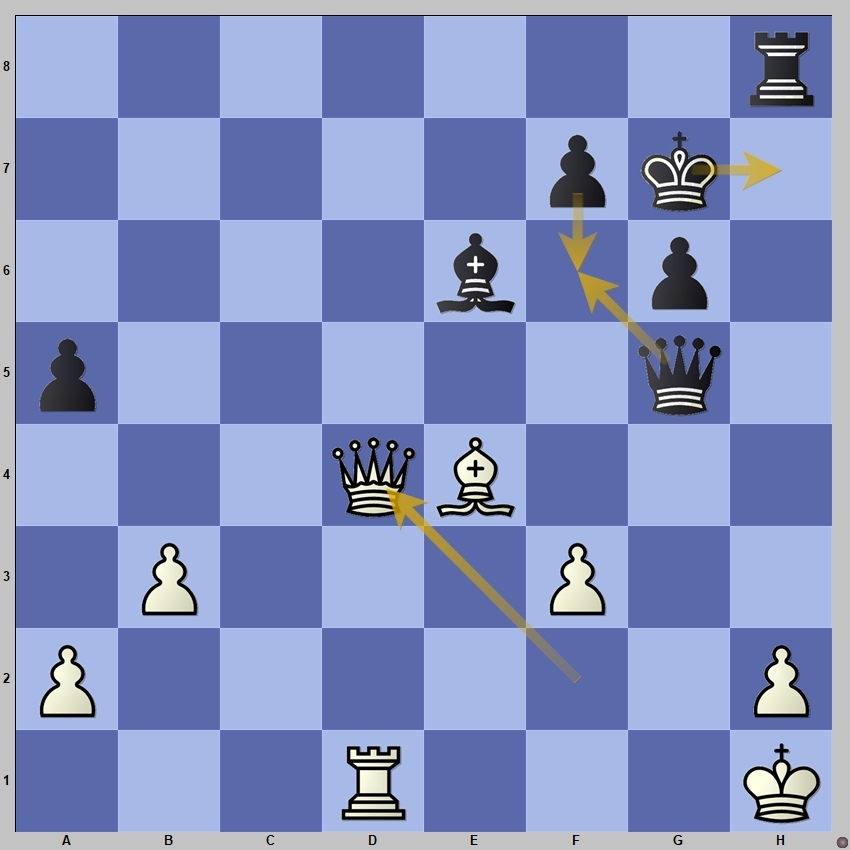
The best defense for Black was 31…Qf6, or even moving the king to h7 with an equal position. Instead, Khadem played 31…f6??, after which Black's position collapsed.
Kosteniuk quickly found the winning combination:
32.Qa7+ Bf7 33.Bxg6!! After 33…Qxg6, 34.Rg1 would follow, and the black queen would be lost. Even a counter-sacrifice on h2 wouldn't save Black: 33...Rxh2+ 34.Kxh2 Qh6+ 35.Kg2 Qxg6+ 36.Kf1 Qh5 37.Qg1+ and White would remain safe.
With no way out, Sara Khadem resigned.
Lela Javakhishvili - Vaishali Rameshbabu
In the Queen's Gambit Declined, the two players engaged in a long, steady game marked by positional maneuvering rather than drama. By move 22, they entered a rook and knight endgame. Javakhishvili offered a threefold repetition, but Vaishali declined. The knights were soon exchanged, leading to a lengthy rook endgame with considerable shuffling but little progress. The game ended in a draw.
Kosteniuk quickly found the winning combination:
32.Qa7+ Bf7 33.Bxg6!! After 33…Qxg6, 34.Rg1 would follow, and the black queen would be lost. Even a counter-sacrifice on h2 wouldn't save Black: 33...Rxh2+ 34.Kxh2 Qh6+ 35.Kg2 Qxg6+ 36.Kf1 Qh5 37.Qg1+ and White would remain safe.
With no way out, Sara Khadem resigned.
Lela Javakhishvili - Vaishali Rameshbabu
In the Queen's Gambit Declined, the two players engaged in a long, steady game marked by positional maneuvering rather than drama. By move 22, they entered a rook and knight endgame. Javakhishvili offered a threefold repetition, but Vaishali declined. The knights were soon exchanged, leading to a lengthy rook endgame with considerable shuffling but little progress. The game ended in a draw.
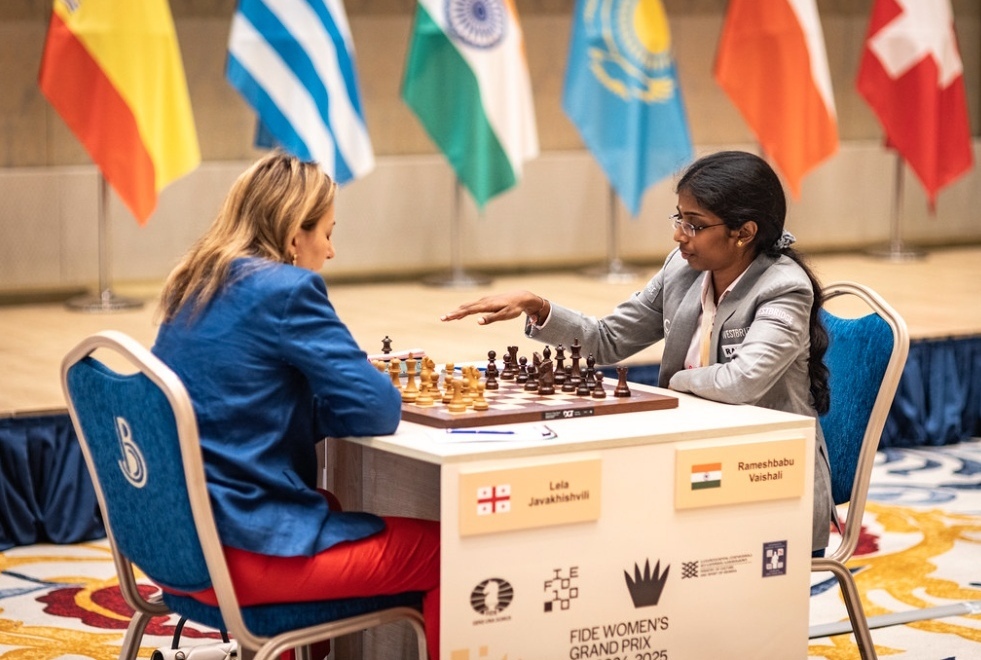
Mariya Muzychuk - Stavroula Tsolakidou
In the Najdorf variation of the Sicilian, Mariya Muzychuk entered the game aggressively, leaving her king in the center while charging forward with her pawns against Black's kingside castle.
In the Najdorf variation of the Sicilian, Mariya Muzychuk entered the game aggressively, leaving her king in the center while charging forward with her pawns against Black's kingside castle.
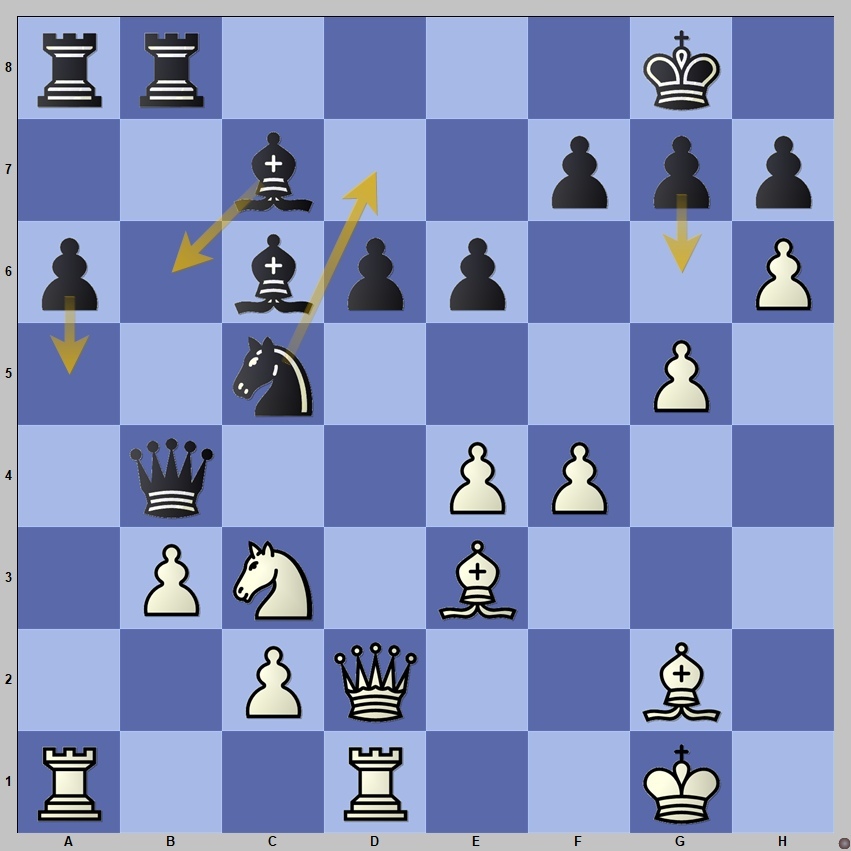
The computer suggests that Black should have played 21…a5 or 21…Bb6, but Tsolakidou opted for 21…g6?, which weakened her kingside. By the middlegame, Muzychuk had a better position with better coordinated pieces, control if the center, and the potential to apply more pressure on the board.

The best way for White to proceed was to activate her king by Kf2 and reroute her knight to d4 via Ne2-d4.
However, Muzychuk played 26.Na4?, effectively losing the biggest part of her advantage.
After 26…Nb6, a series of exchanges followed, leading to a rook endgame where White was a pawn up but could not achieve more than a draw.
Alina Kashlinskaya - Bibisara Assaubayeva
However, Muzychuk played 26.Na4?, effectively losing the biggest part of her advantage.
After 26…Nb6, a series of exchanges followed, leading to a rook endgame where White was a pawn up but could not achieve more than a draw.
Alina Kashlinskaya - Bibisara Assaubayeva
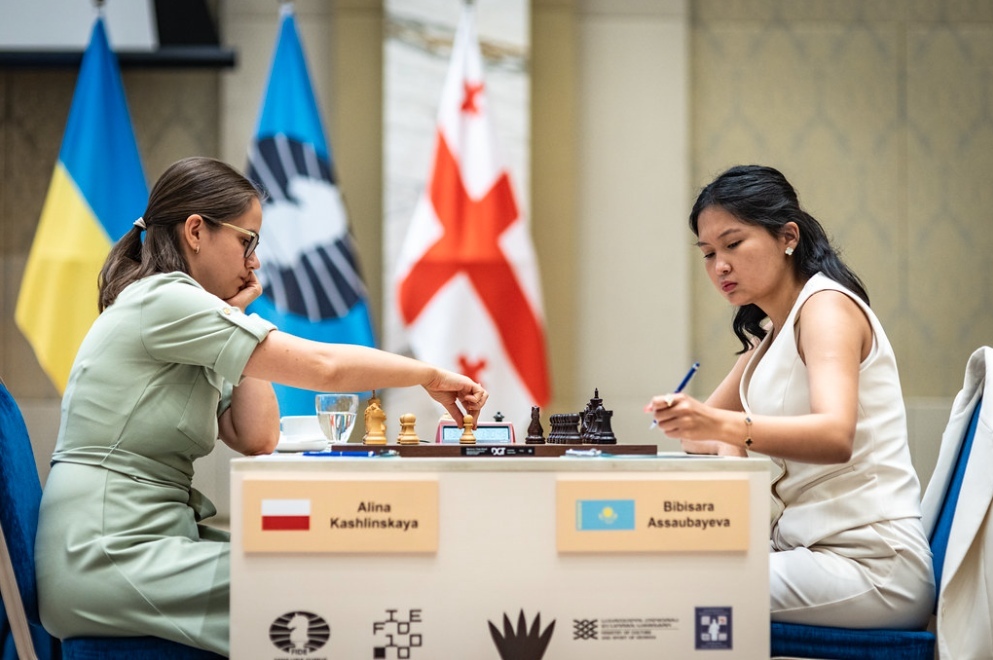
In a trendy line of the King's Indian Defense with an early h2-h4 both players aimed for a double-edged position. White made an early advance with her pawn to h6, penetrating Black's kingside castle. Black sacrificed a pawn to gain some initiative a la Benko Gambit but did not get sufficient compensations it seems.
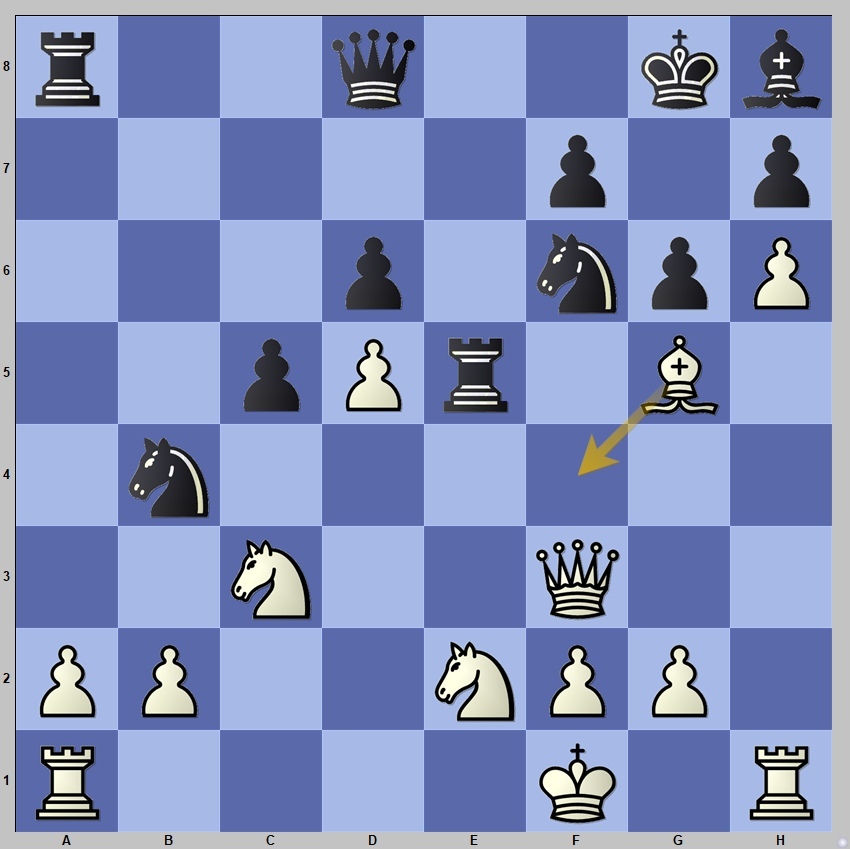
White's pieces are well-coordinated. The queen on f3 is poised to shift to a kingside attack or support central activities. However, Black's bishop on h8 is passive, restricted by the pawn structure and lacking active prospects. On the other hand, Black's knight on b4 is active, but the bishop on h8 is still locked away, and there's a potential pin on f6.
Despite the position seeming more demanding for Black, Kashlinskaya decided to repeat moves, and the game ended in a draw:
18.Bf4 Re8 19.Bg5 Re5 20.Bf4 Re8 21.Bg5 And the two agreed to split a point.
Anna Muzychuk - Nana Dzagnidze
In their game featuring the Exchange Variation of French Defense, everything proceeded smoothly until Black's tenth move.
Despite the position seeming more demanding for Black, Kashlinskaya decided to repeat moves, and the game ended in a draw:
18.Bf4 Re8 19.Bg5 Re5 20.Bf4 Re8 21.Bg5 And the two agreed to split a point.
Anna Muzychuk - Nana Dzagnidze
In their game featuring the Exchange Variation of French Defense, everything proceeded smoothly until Black's tenth move.
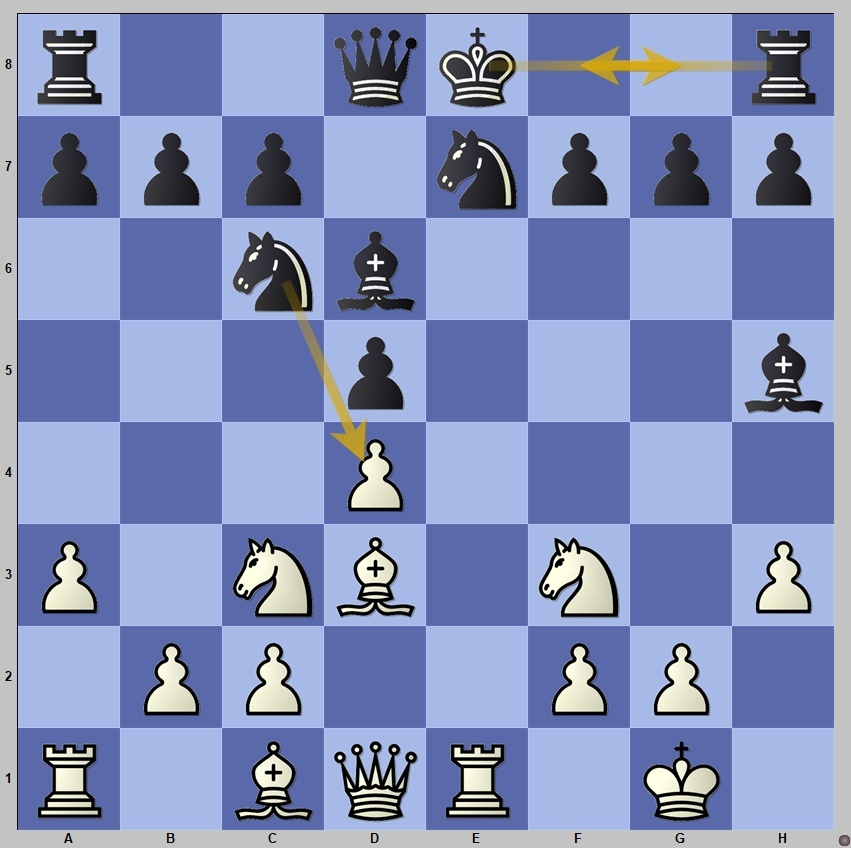
The position was sharp, requiring precise play from Black. According to the engine, the best move for Black was to castle: 10...O-O 11.Bxh7+ Kh8 12.g4 Kxh7 13.gxh5 Kg8 14.Ng5 Qd7 with a tense position which is slightly better for White. However, Nana opted to take on d4.
10…Nxd4 11.g4 Nxf3+ 12.Qxf3 Bg6 13.Bxg6 (better was 12.Nxd5 immediately).13…hxg6 14.Nxd5 0-0 Moving the king away from immediate danger. After 15.Nxe7+ Bxe7 16.Qxb7 White emerged a pawn up but after making an inaccuracy on move 19 let her advantage slip away.
16…Bf6 17.c3 a5 18.Qc6 Rb8 19.a4? Bh4 20.Rb1
10…Nxd4 11.g4 Nxf3+ 12.Qxf3 Bg6 13.Bxg6 (better was 12.Nxd5 immediately).13…hxg6 14.Nxd5 0-0 Moving the king away from immediate danger. After 15.Nxe7+ Bxe7 16.Qxb7 White emerged a pawn up but after making an inaccuracy on move 19 let her advantage slip away.
16…Bf6 17.c3 a5 18.Qc6 Rb8 19.a4? Bh4 20.Rb1

Nana spent a lot of time contemplating her next move and then decided on a combination that led to further difficulties. The computer recommended activating the b8-rook with 20…Rb6, followed by transferring it to e6 with sufficient compensation for a pawn. Instead, Nana played:
20…Bxf2? 21.Kxf2 Qh4 22.Ke2! Once again, Rb8, followed by Re6+ with tempo, was the better choice. Instead, in desperate time trouble, Nana continued with 22…Qxh3+ 23.Qf3! but Anna consolidated her position and emerged with an extra bishop.
20…Bxf2? 21.Kxf2 Qh4 22.Ke2! Once again, Rb8, followed by Re6+ with tempo, was the better choice. Instead, in desperate time trouble, Nana continued with 22…Qxh3+ 23.Qf3! but Anna consolidated her position and emerged with an extra bishop.
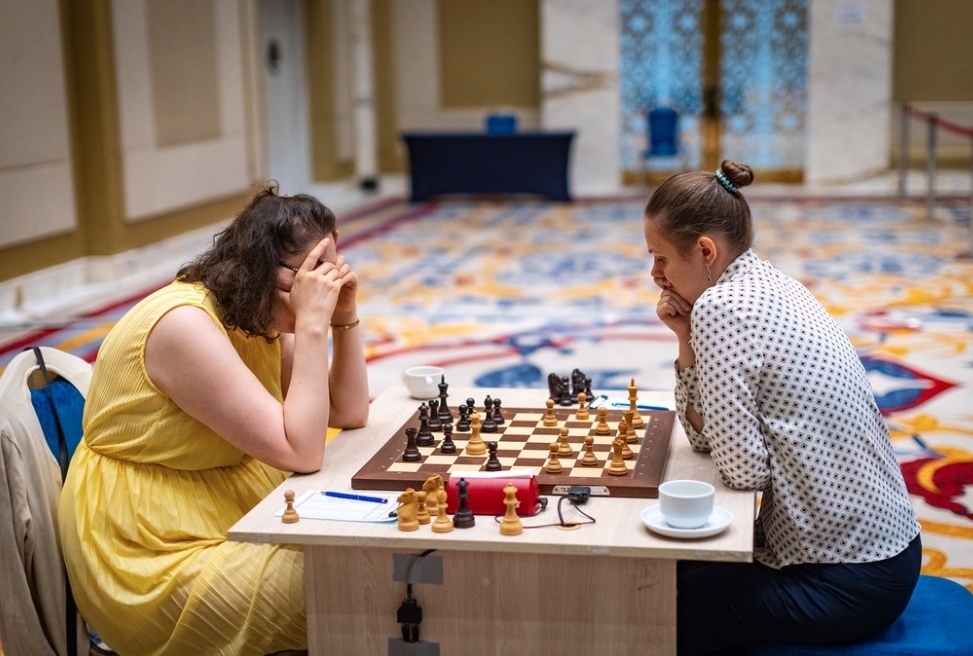
Nana continued to struggle in a lost endgame, hoping to find a perpetual check or advance her g-pawns. She pressed on, giving checks to the white king from all sides of the board, clinging to the hope of a miracle. Muzychuk had to be careful not to misstep. Eventually, she sacrificed the bishop but managed to position her king on b7 to support the promotion of her a-pawn.
Muzychuk was just a step away from victory when this happened:
Muzychuk was just a step away from victory when this happened:
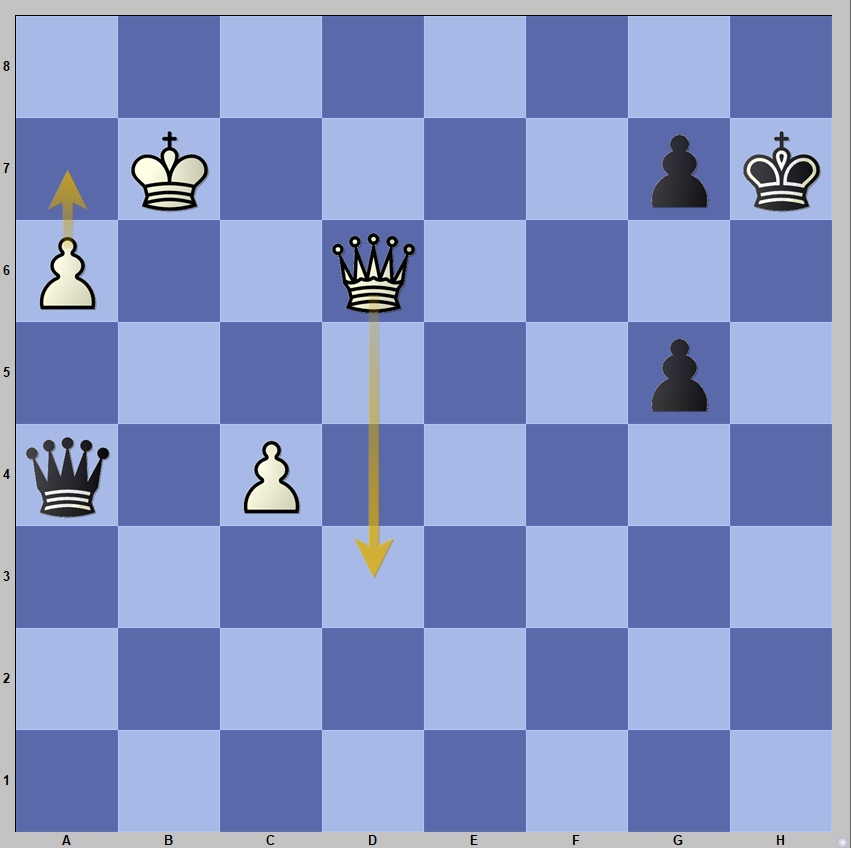
After 73. a7! Qb3+ 74. Qb6 Qf3+ 75. Qc6 Qf7+ 76. Ka6 Black can't stop the a-pawn promotion. Anna, however, opted for 73. Qd3+, which was also winning but allowed Nana to stay in the game a bit more. Just four moves later, Dzagnidze got her chance and jumped on the opportunity.
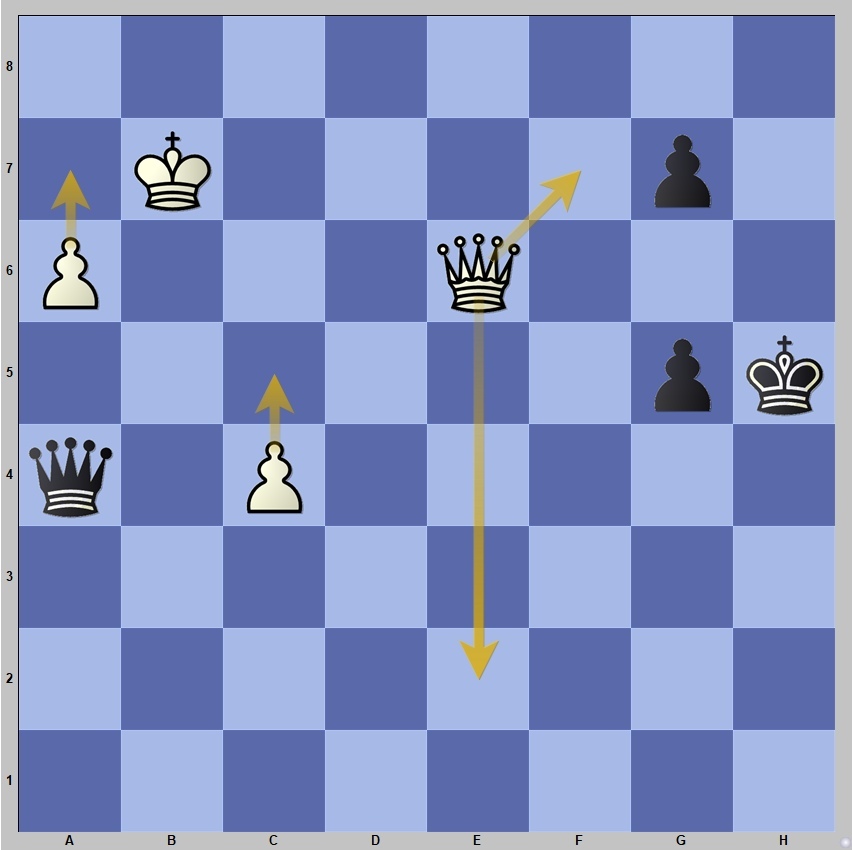
At this moment, Muzychuk had about a minute and a half on her clock, while Dzagnidze had more than 20 minutes. Although Anna's leg was shaking beneath the table, her face remained calm. She had many winning options, namely 78. Qe2, 78. c5, 78. Qf7, to name a few.
Instead, Anna played ill-timed 78.a7??
The evaluation bar dropped from 4.8 to 0.0 — a shocking turn of events.
Anna tried to navigate her way out of the mess, moving her king around the board, but it wasn't meant to be. The game ended in a draw after 102 moves.
The fifth round of the first tournament in the 2024/25 Women's Grand Prix series starts on Monday, August 19, 3 PM local time in Tbilisi, Georgia.
Round 5 pairings:
Nana Dzagnidze - Alexandra Kosteniuk
Bibisara Assaubayeva – Anna Muzychuk
Stavroula Tsolakidou – Alina Kashlinskaya
Vaishali Rameshbabu - Mariya Muzychuk
Sarasadat Khademalsharieh - Lela Javakhishvili
Written by Milan Dinic
Photos: Anna Shtourman
Instead, Anna played ill-timed 78.a7??
The evaluation bar dropped from 4.8 to 0.0 — a shocking turn of events.
Anna tried to navigate her way out of the mess, moving her king around the board, but it wasn't meant to be. The game ended in a draw after 102 moves.
The fifth round of the first tournament in the 2024/25 Women's Grand Prix series starts on Monday, August 19, 3 PM local time in Tbilisi, Georgia.
Round 5 pairings:
Nana Dzagnidze - Alexandra Kosteniuk
Bibisara Assaubayeva – Anna Muzychuk
Stavroula Tsolakidou – Alina Kashlinskaya
Vaishali Rameshbabu - Mariya Muzychuk
Sarasadat Khademalsharieh - Lela Javakhishvili
Written by Milan Dinic
Photos: Anna Shtourman
